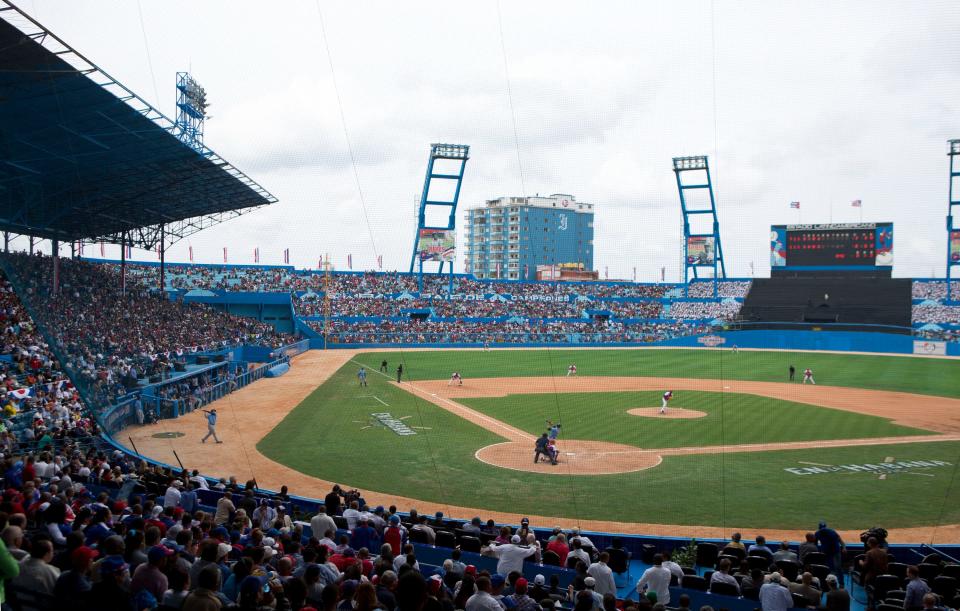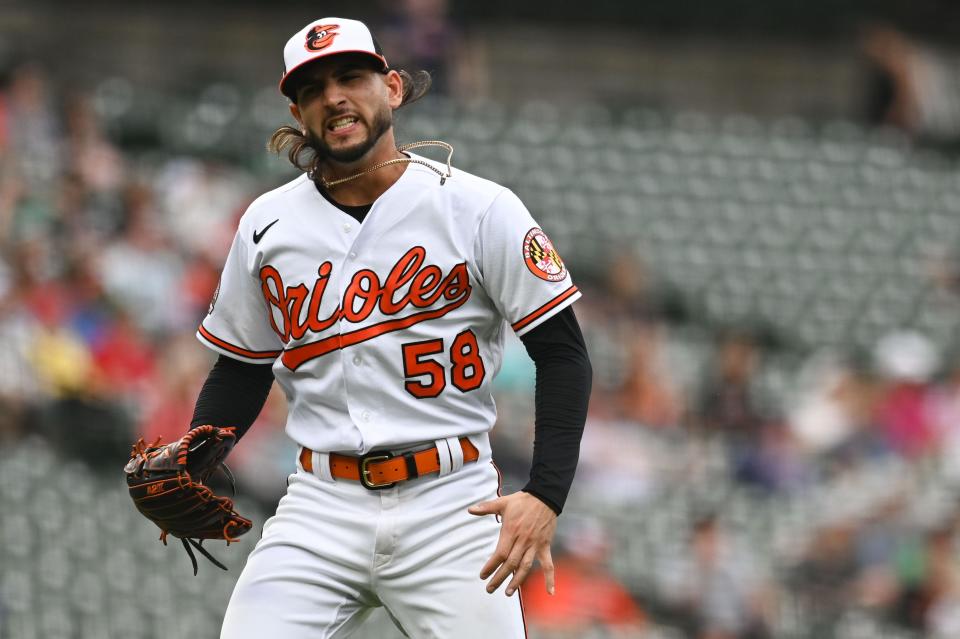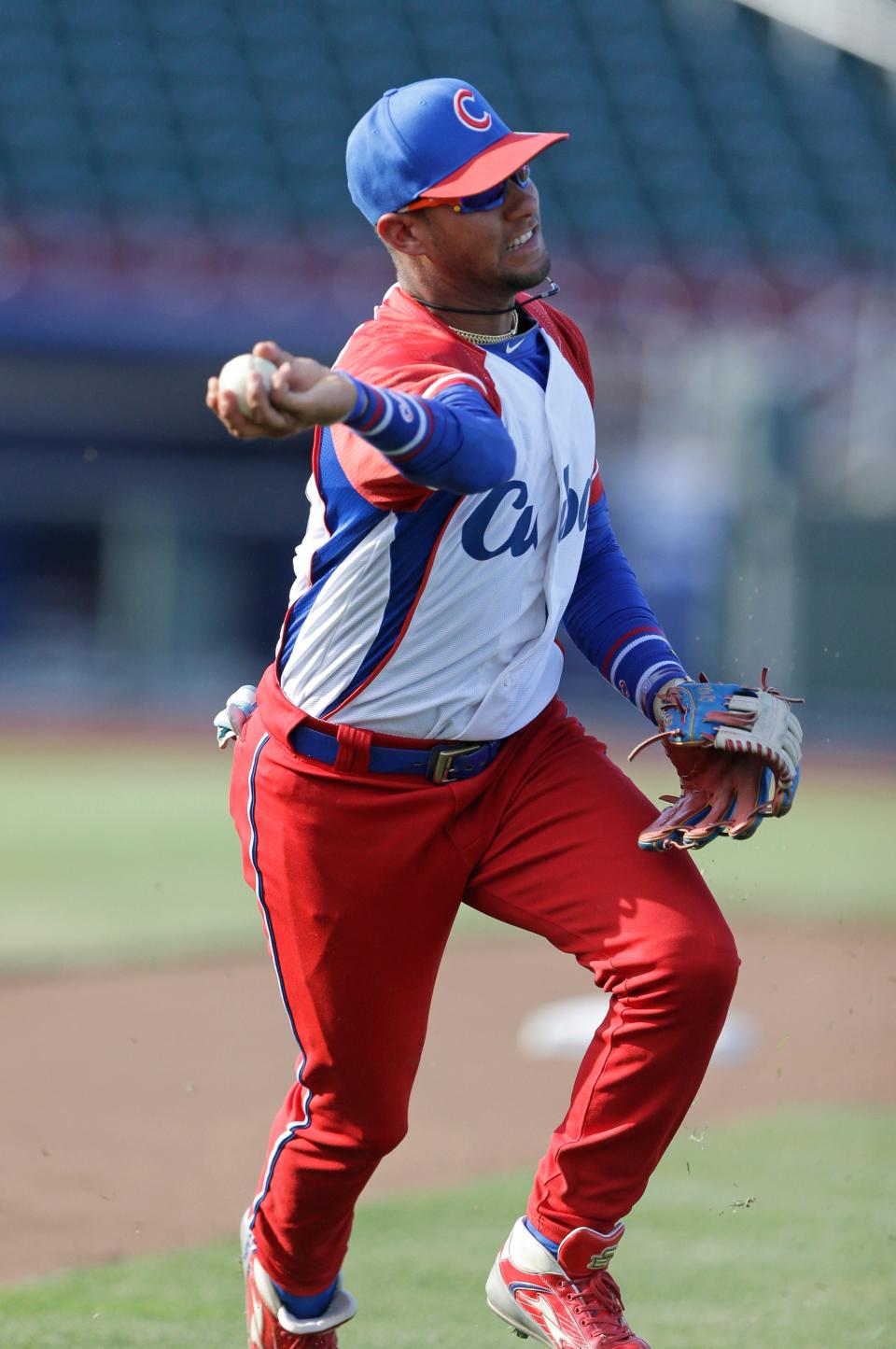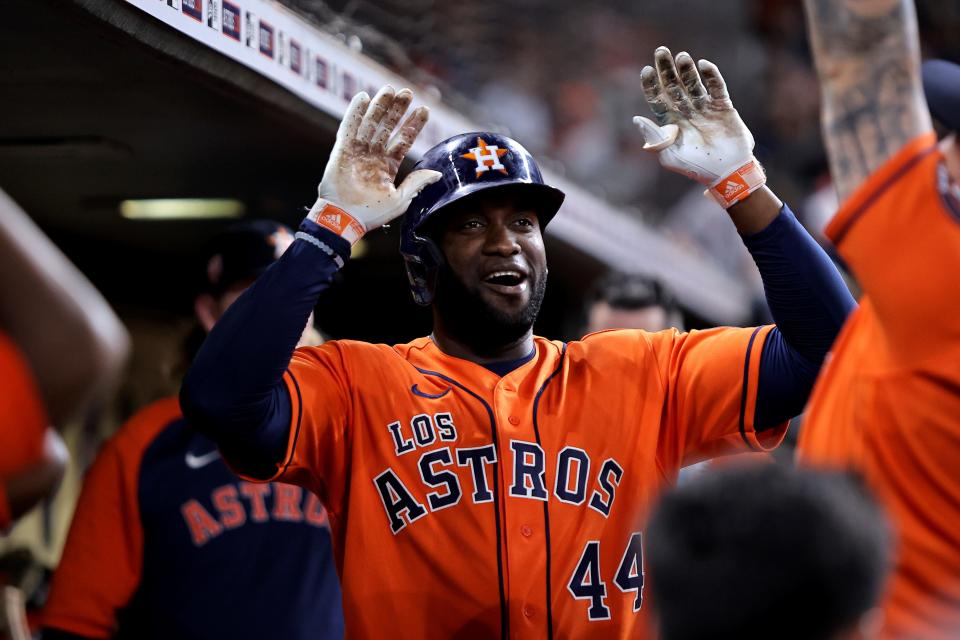'Brother, I could make a documentary': The evolution of baseball player departures from Cuba

BALTIMORE — Aledmys Díaz stuffed his jersey into a small backpack and walked away from the Cuban National Team during a tournament in the Netherlands in 2012.
Cionel Pérez was coming off a terrific season in Cuba's Serie Nacional when he fled, leaving the island by boat in 2015, bound for the Dominican Republic.
The following year, brothers Yuli and Lourdes Gurriel, considered Cuban baseball royalty, had finished playing in the Caribbean Series when they abandoned Cuba's team in the Dominican, sneaking across the border into Haiti.
These departures illustrate some of the most common clandestine paths players used for years as they sought to flee Cuba for a chance to play baseball in the United States.
Whether evading Cuba's coastal security to brave open waters or spiriting away during international tournaments, those paths often meant avoiding capture, risking their lives and dealing with so-called buscones, "finders", who facilitate the use of smugglers.
HOUSTON: Gurriel, Álvarez the linchpins to Astros' Cuban connection
STAY UP-TO-DATE: Subscribe to our Sports newsletter now!
Standing in the Baltimore Orioles' clubhouse in the closing weeks of the season, Pérez wouldn't go into specifics about how he left Cuba.
"It’s very delicate. We dealt with many situations," the left-handed reliever told USA TODAY Sports. "There are a lot of things I don’t like talking about because they're very personal. Remembering them brings me a lot of sadness. But I think at some point in my life, in my career it would be a good story to tell."

The stories have changed over the past decade, says Francys Romero, a Baseball Writers' Association of America member who closely tracks the departures of players from Cuba. His Spanish-language 2020 book, "El sueño y la realidad: Historias de la emigración del béisbol cubano (1960-2018)" — ("The Dream and the Reality: The History of the Emigration of Cuban Baseball") — details the departure of nearly every Cuban baseball player in the aftermath of Fidel Castro's 1959 Communist revolution.
"Before 2013, what predominated were illegal exits by sea," Romero told USA TODAY Sports. "But starting in 2014 … there was an explosion because at that point it was a rampant exodus. It wasn’t anything organized. It was an exodus en masse. Many athletes started leaving through airports …
"I think I came very close to definitively tracking the change. The illegal exits fell to almost 25 percent and the legal exits rose to more than 70 percent."
Cuban reforms supercharge baseball exodus
Among the reasons: In 2013, Cuba ended a five-decade ban on athletes playing professional sports in other countries and lifted certain travel restrictions, paving the way for baseball players to sign pro contracts in places such as Asia and Europe. In December 2014, the Barack Obama administration announced it would reopen U.S. diplomatic relations with Cuba for the first time in more than 50 years.
But the ongoing U.S. trade embargo meant Cuban players still couldn't travel directly to the United States or directly sign contracts with U.S. teams. And Cuba's travel reforms still included restrictions for doctors, scientists, military members and top athletes. Players still have to establish residency in a third country before they can be declared free agents and sign with major league organizations.
Despite those restrictions, a record 202 baseball players — including Pérez and Houston Astros slugger Yordan Álvarez — left Cuba in 2015, according to Romero, who says, excluding COVID years, an average of "about 100 players are leaving Cuba in a normal year."

Although the reforms were in place at the time he left, Astros first baseman Yuli Gurriel decided not to wait any longer and left illegally in February 2016 as his 32nd birthday approached. His decision paid off five months later with a a five-year, $47.5 million contract from the Astros.
"When I was in Cuba – and I think still now – the players on the national team were regulated by the Cuban government through INDER," Gurriel told USA TODAY Sports about the Instituto Nacional de Deportes, Educación Fisica y Recreación (National Institute for Sports, Physical Education and Recreation), Cuba's governing sports body.
"You don’t have a private passport, the blue one that everybody has. The players on the national team don’t have that passport, but they travel with an official passport that they give you when you get to the airport. They give it to you. The players on the national team in my time couldn’t leave for a third country."
While illegal departures may have declined in recent years, Cuba did see its largest number of defections at a single tournament in September 2021, when 12 players abandoned the Cuban team playing in the U-23 Baseball World Cup in Mexico. Prior to that, the record had been five during a tournament in Mexico in 1996, and only seven players total between 2001 and 2010 had abandoned Cuban teams during international competitions, Romero said.
"Seven in a decade and in that (World Cup) tournament there were 12 in 15 days," said Romero, who like some other observers, dislikes terms such as defector or defection because they say those have connotations of military desertion. "It was something incredible."
Of those 12 players, only two — outfielder Loidel Chapelli Jr. ($500,000 bonus with the Chicago White Sox) and pitcher Bryan Chi ($10,000 bonus with the Texas Rangers) — have officially signed. The Oakland Athletics reportedly are front-runners to sign pitcher Luis Morales, who bolted minutes after the Cuban team arrived in Mexico.
Another three players had defected during an Olympic qualifier in Florida in May 2021, including infielder César Prieto, who has signed with the Orioles ($650,000 bonus).
"Cuba has blamed the departures of the recent years — of those 12 players in 2021 — on the cancellation of the agreement," Romero said of a 2018 agreement between MLB and the Cuban Baseball Federation. "But a lot of those players who left weren’t going to sign. They weren’t of interest to major league organizations before that agreement. … Of those 12 players only — I talked to scouts at that time — and they told me there was only talent to sign four or five. Those players were going to escape in Mexico even if there was an agreement."
MLB-Cuba agreement was short-lived
With U.S.-Cuba relations normalized under Obama, MLB and the Cuban Baseball Federation in December 2018 had announced an agreement that would have allowed players to leave Cuba without having to use smugglers or sneak away during foreign tournaments.
"The objective of the agreement," read a joint announcement with the players union, "is to end the dangerous trafficking of Cuban players who desire to play professional baseball in United States."
Under the deal, Cuban players who were at least 25 years old and had six or more years of playing experience would have been allowed to sign with major league organizations, with teams paying release fees for players, who would have been required to pay Cuban income tax on their contracts.
But in April 2019, the nascent Donald Trump administration canceled the agreement, the U.S. Treasury Department ruling that the Cuban Baseball Federation was part of the Cuban government and therefore subject to the U.S. trade embargo.
John Blundell, MLB vice president of communications, declined via email to discuss how the scouting and signing of Cuban players has changed over the years, or what impact the cancellation of the agreement with Cuba has had.
"Would I like to see the Cuban government make money on the backs of these players? No," Eddie Dominguez, who joined MLB's Department of Investigations in 2008, told USA TODAY Sports. "But yes, in the big picture, the answer is yes, that (agreement) would have helped."
Fired by MLB in 2014 in the aftermath of its Biogenesis doping investigation, the former Boston police detective wrote "Baseball Cop: The Dark Side of America's National Pastime" in 2018. Dominguez, a Cuban native whose family left the island legally in 1966, believes MLB's process for signing Cuban players has long bred corruption.
"And the reason is that you’re putting a valued individual, a baseball player, a young baseball player in a very vulnerable position," Dominguez said, "where someone, an agent, a buscon — whatever you want to call him — knows that there’s going to be profit made out of kidnapping this kid basically."
'It was an immense process'
And Cuba's current system of "legal" departures has bred its own forms of corruption within the Cuban government.
Although top players are often blocked from leaving Cuba, they can work around those travel restrictions, Romero says, using "investors" who pay to unblock their departures in exchange for 30% or more of those players' future earnings.
"Normally they would be restricted from leaving through an airport," Romero said. "They are blocked because they are players of international talent. That happens also with doctors and many sectors of Cuban society. And so, the people who apparently are in this business would pay a large money figure to unblock these Cuban players, so they can leave legally through an airport. It’s like they are unblocked in the computer system and then they can leave."
In recent years, young international-caliber Cuban stars, such as Yoán Moncada of the White Sox, have managed to leave Cuba legally, securing government permission to fly to countries other than the U.S.
Since Moncada left Cuba in 2014, his agent David Hastings has provided scant details about how Moncada established residency in Guatemala before getting a $31.5 million signing bonus from the Boston Red Sox in 2015.
Whether they have left Cuba legally or illegally, players often are reluctant to provide details about their experiences getting out of the country.
"Brother, I could make a documentary," Álvarez told USA TODAY Sports. "That's not something I can tell you here. You can imagine. It took me almost two years to be able to leave Cuba."

Álvarez's father, mother and younger brother left Cuba for the Dominican Republic in 2014 on what a 2019 MLB.com story described as an "exploratory mission" to find a baseball program to train Álvarez, who had to stay behind in Cuba.
"The (players) who leave are the ones they (Cuban officials) want to leave; it’s not whoever wants to leave," Álvarez said. "The process for me was something independent. It was a decision that I made and they tried to not permit it, but in one way or another I was able to do it."
Álvarez, who eventually signed with the Los Angeles Dodgers for $2 million in June 2016 before a trade to Houston two months later, managed to join his family in the Dominican Republic and then established residency in Haiti, where he once bumped into the Gurriel brothers while they were doing the same.
"It was an immense process," Álvarez said. "They (Álvarez's family) had to leave Cuba alone and leave me behind and try to reclaim me. It’s a very long story."
Smuggling schemes led to federal trials
As players continued to pour out of Cuba — 32 in 2011, 22 in 2012, 51 in 2013, 71 in 2014, 202 in 2015, 125 in 2016, 73 in 2017 and 76 in 2018 — harrowing tales of Cuban players being held against their wills, threatened or extorted by smugglers began to emerge.
The plights of Dodgers outfielder Yasiel Puig, Texas Rangers outfielder Leonys Martín and White Sox first baseman José Abreu, among others, came to light as part of civil lawsuits during the early 2010s that eventually led to federal criminal trials in Miami.
One trial resulted in a 2014 guilty plea by Miami businessman Gilberto Suárez for conspiring to smuggle Puig out of Cuba in exchange for a percentage of his salary.
Another involving the smuggling of 17 Cuban players — including Martín and Abreu — featured testimony from Abreu that he swallowed part of a fake passport while aboard an Air France flight from Haiti to the U.S. to hide his illegal travel with smugglers. That case resulted in the conviction of Miami sports agent Bartolo Hernández and baseball trainer Julio Estrada in 2017.
"These buscones, they align themselves with agents and they make these kids sign a contract under obviously adverse circumstances," Dominguez said. "When they’re in Mexico, they’re being held up in a house and not only will (players) give them a percentage of the signing bonus but over a period of time, the player will have to give them 'X' amount of money a year or a percentage of the money on a yearly basis. … They live with the threat of these mobsters that brought them out of the country, feeling like they will forever owe them for what they did for them."
Díaz, whose name was mentioned in Suárez's 2014 plea agreement as a player he also had helped, escaped Cuba before the country's current liberalized travel rules.
He endured a 20-month ordeal after defecting in 2012 that included a one-year suspension by MLB for a discrepancy with his birthdate. After establishing residency in Mexico, he was granted free agency and signed a four-year, $8 million deal with the St. Louis Cardinals in March 2014.
Díaz has seen the changes of the past decade but doesn't think the current system is any better despite the recent increase in "legal" departures from Cuba.
"In the end, the Cuban government controls everything in Cuba, and that’s not a secret," Díaz said. "INDER is a government organization and those are the calculations that are putting the brakes on there being more Cubans in the big leagues. I think there should be the possibility for players to decide for themselves, that the government not have any involvement in the contract nor the number of years that a player wants to play here in the United States, something more clear, that it be something directly with organizations in the United States."
This article originally appeared on USA TODAY: Evolution of how baseball players leave Cuba for chance to play in MLB

